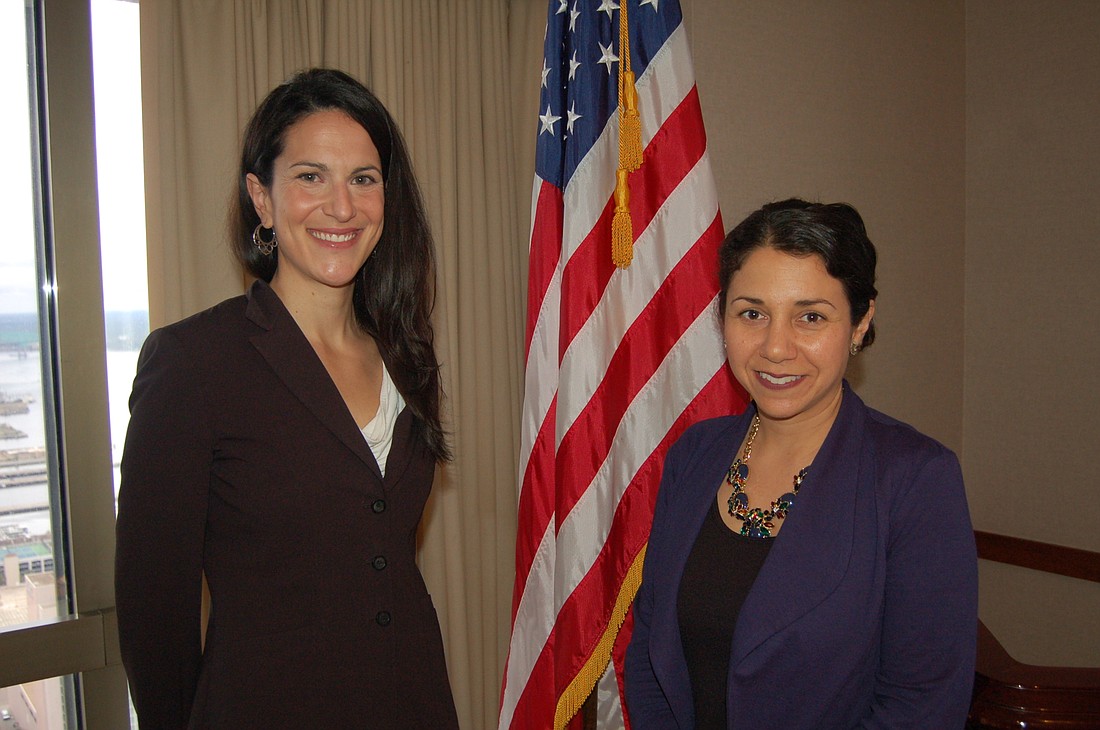
There are two ways to become a judge in Florida: Mount a successful campaign and be elected by popular vote, or be appointed by the governor.
The Jacksonville Women Lawyers Association learned the finer points of the second method Feb. 8 from attorney Michelle Bedoya Barnett, former vice chair of the 4th Judicial Circuit Judicial Nominating Commission, and Meredith Sasso, deputy general counsel in the Executive Office of the Governor.
They were joined via telephone by Daniel Nordby, Gov. Rick Scott’s general counsel and a former member of the state Supreme Court Nominating Commission.
“Judicial appointments are one of the most consequential authorities of a governor,” Nordby said, because judges serve for many years after a governor leaves office, deciding issues and shaping state law.
He also said that since Scott took office in 2011, he has appointed 330 judges for circuit and county courts, courts of appeal and judges of compensation claims, about 40 percent of whom are women.
Candidates to fill judicial vacancies are selected by judicial nominating commissions.
There are 27 commissions: One for the state Supreme Court, one for each of the five district courts of appeal, one for each of the 20 circuit courts and the county courts within the circuit, and one statewide commission for judges of compensation claims.
Vacancies occur when a judge retires or resigns, dies, is elevated to a higher court or there is a newly created judgeship.
The commissions comprise nine members appointed by the governor.
Four are certified by the board of governors of The Florida Bar, the other five are direct gubernatorial appointments.
Barnett said the process begins when an attorney fills out a comprehensive application for consideration by the commission.
Questions are related to education, experience, personal and business finances and family. Writing samples and case summaries also are included.
The application amounts to “this is my life, everything I’ve done, wrong or right,” said Barnett. “It’s 25 pages, but you know attorneys, some people turn it into 100 pages.”
Attention to detail must be paid when filling out the application, and in particular, avoid typographical errors.
“Have 10 people look at your application with lawyers’ eyes,” Barnett said.
After the applications are vetted, candidates are interviewed by the commissioners. The tone shifts from formal to casual, to allow the applicant to be evaluated on multiple levels in a short period of time.
“It’s part job interview, part appellate argument and part cocktail party or sorority rush – in about 20 minutes,” Barnett said.
Commissioners then deliberate and send no fewer than three and no more than six candidates to the governor, who has 60 days to appoint a judge from the pool of nominees.
Sasso, who coordinates the judicial nomination process for the governor’s office, said when the applications arrive in Tallahassee, there’s a similar procedure, including staff extensively reviewing the applications, contacting each applicant’s references and conducting personal interviews before turning over the decision to the state’s chief executive.
“A lot of it is duplicative,” she said.
It’s practically unheard of for a candidate to be appointed on the first attempt. Some sitting judges weren’t appointed until they had applied 10 or more times, Sasso said.
And don’t let experience or age hold you back from applying, she added. Scott’s appointments have ranged in age from 29 to 67 years.
Scott recently appointed JWLA President Jennifer Shoaf Richardson to succeed Barnett on the 4th Circuit Judicial Nominating Commission for a term that will expire in 2020.